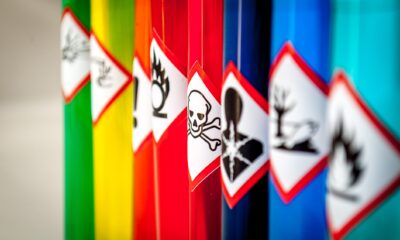

Energy
Italy’s Largest Fashion Supply Chain Pledges to Detox Hazardous Chemicals
In the largest commitment of its kind, 20 companies from Italy’s Prato textile district simultaneously announced today in a press conference hosted by Greenpeace in Milan their commitment to Detox, the highest standard in toxic-free fashion production. Prato is home to Italy’s oldest textile manufacturers and most extensive fashion supply chain, that exports over $2.5 billion Euros of clothing annually to global brands including Burberry, Prada, Valentino, Armani, and Gucci.
The Confindustria Toscana Nord, representing the largest textile district in Europe, will oversee the regional adoption of the Detox hazardous chemical elimination standards never before implemented collectively at the supply chain level. The agreement will affect over 13 thousand tons of yarn and raw materials as well as over 13 million meters of fabric every year.
“Prato’s decision will ripple throughout the global textile supply chain and hopefully encourage more manufacturers to Detox,” said Giuseppe Onufrio, Executive Director, Greenpeace Italy. “They have chosen the chemical management `gold´ standard by which all other fashion brands and sectoral hazardous chemical initiatives will be measured. Now that their own suppliers are committing to eliminate hazardous chemicals, brands such as Gucci, Prada, and Armani have no excuse but to follow suit.”
To date, the Prato based companies have already removed several hazardous chemical groups required by the Detox campaign. These include brominated and chlorinated flame retardants, organotins compounds, and amines associated with azo dyes that can have negative effects on human reproductive systems and cause cancer. As required by any Detox action plan, they have set a clear and ambitious list of all hazardous chemicals they should have eliminated from the supply chain by 2020. They have also defined shorter timelines to remove problematic hazardous chemicals including poly- and perfluorinated compounds (PFCs), a chemical group used in outdoor gear, which they will discontinue using by the summer of 2016.
Highlights of the Prato agreement include the removal of hazardous chemicals from:
● Yarn Production: 4,500 tons/year
● Fabric Production: 4,500,000 meters/year
● Textile Raw Materials Production: 1,800 tons/year
● Yarn Dyed: 3,700 tons/year
● Fabrics Dyed: 8,800,000 meters/year
● Chemicals Produced: 3,200 tons/year
“It is important for our association and our companies of Prato to show the world that we are physically and financially committed to putting the Detox requirements into practice,” said Andrea Cavicchi, President, Confindustria Toscana Nord. “In the upcoming months we will continue to detox our manufacturing and further green a supply chain that proudly provides global brands with the highest standard in the textile industry.”
The Confindustria Toscana Nord plans to deepen its commitment to toxic free fashion in 2016 including developing and providing tools to support Detox implementation, creating an auditing protocol, tracking progresses, publishing case studies, and increased transparency through publication of testing results.
The Greenpeace Detox campaign demands that fashion brands commit to eliminate the use of all hazardous chemicals by 2020 and requires their suppliers to disclose the releases of toxic chemicals from their facilities to communities on an online independent platform. The Prato region’s commitments will be added to the growing list of companies choosing to Detox their fashion by 2020 including 35 international fashion and textile brands and retailers, representing more than 15% of global textile production in terms of sales. Among the companies joining Detox are Miroglio and Inditex as well as major international brands such as Valentino, Adidas, H&M, and Burberry.
The first group of Prato companies committed to Greenpeace’s Detox campaign (with company links: https://www.confindustriatoscananord.it/chi-siamo/attivita-e-progetti-speciali/detox):
• Filati Bemiva Spa (yarn manufacturer)
● Cromos Srl (yarn dyeing and finishing)
● Lanificio Bellucci Spa (fabric manufacturer)
● Daykem Srl (chemical manufacturer)
● F.Lli Ciampolini & C. Spa (fabric dyeing and finishing)
● Pecci Filati Spa (yarn manufacturer)
● Achimo Srl (chemical manufacturer)
● Jersey Mode Spa (fabric dyeing and finishing)
● Filatura Papi Fabio Spa (yarn manufacturer)
● Tintoria Alessandrini Srl (yarn dyeing and finishing)
● Progetto Lana Srl (raw materials manufacturer)
● Lanificio Dell’Olivo Spa (yarn manufacturer)
● Industria Italiana Filati Spa (yarn manufacturer)
● Marini Industrie Spa (fabric manufacturer)
● Tintoria Fiordiluce Srl (fabric dyeing and finishing)
● Tintoria Cometa Srl (fabric dyeing and finishing)
● Ilaria Manifattura Lane Srl (yarn manufacturer)
● Filati Biagioli Modesto Spa (yarn manufacturer)
● Furpile Idea Spa (yarn manufacturer)
● Tintoria Biagioli Modesto(yarn dyeing and finishing)


 Environment12 months ago
Environment12 months agoAre Polymer Banknotes: an Eco-Friendly Trend or a Groundswell?

 Features11 months ago
Features11 months agoEco-Friendly Cryptocurrencies: Sustainable Investment Choices

 Features12 months ago
Features12 months agoEco-Friendly Crypto Traders Must Find the Right Exchange

 Energy11 months ago
Energy11 months agoThe Growing Role of Solar Panels in Ireland’s Energy Future




























